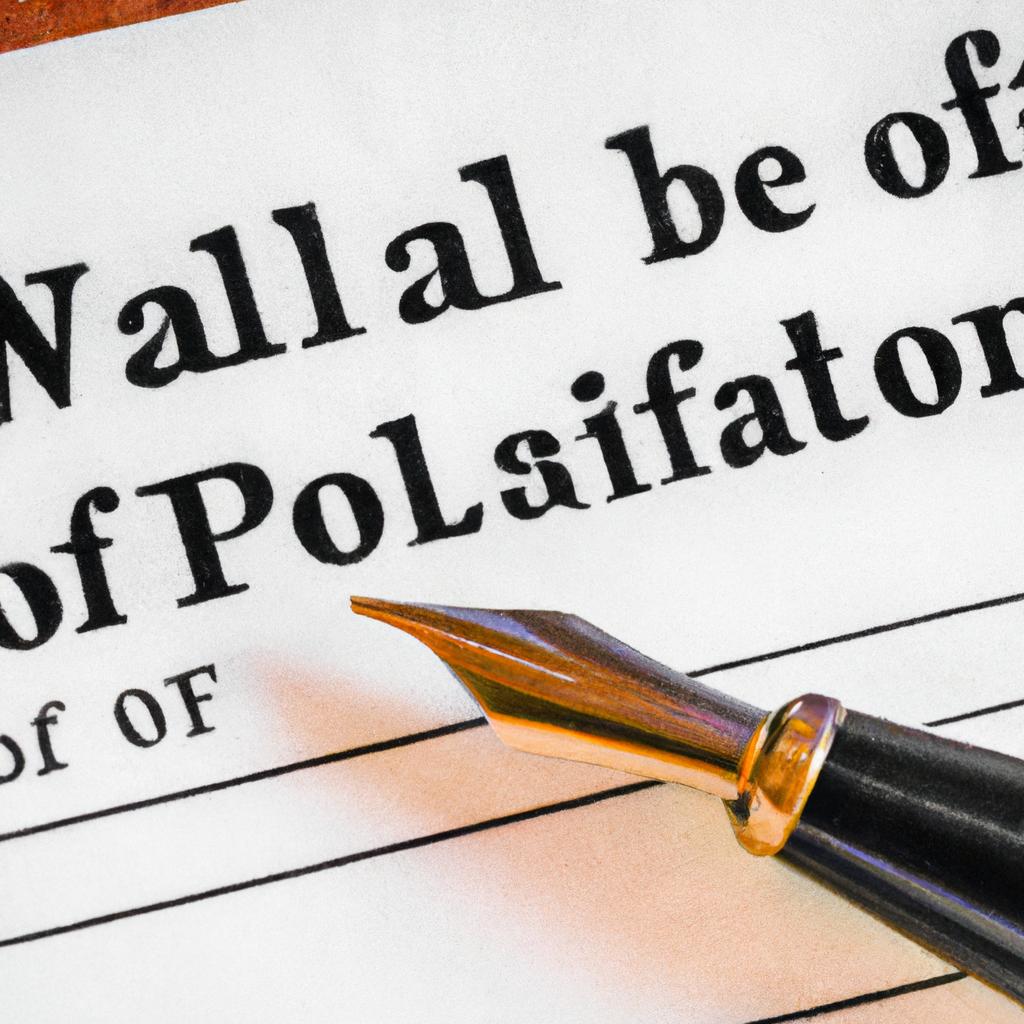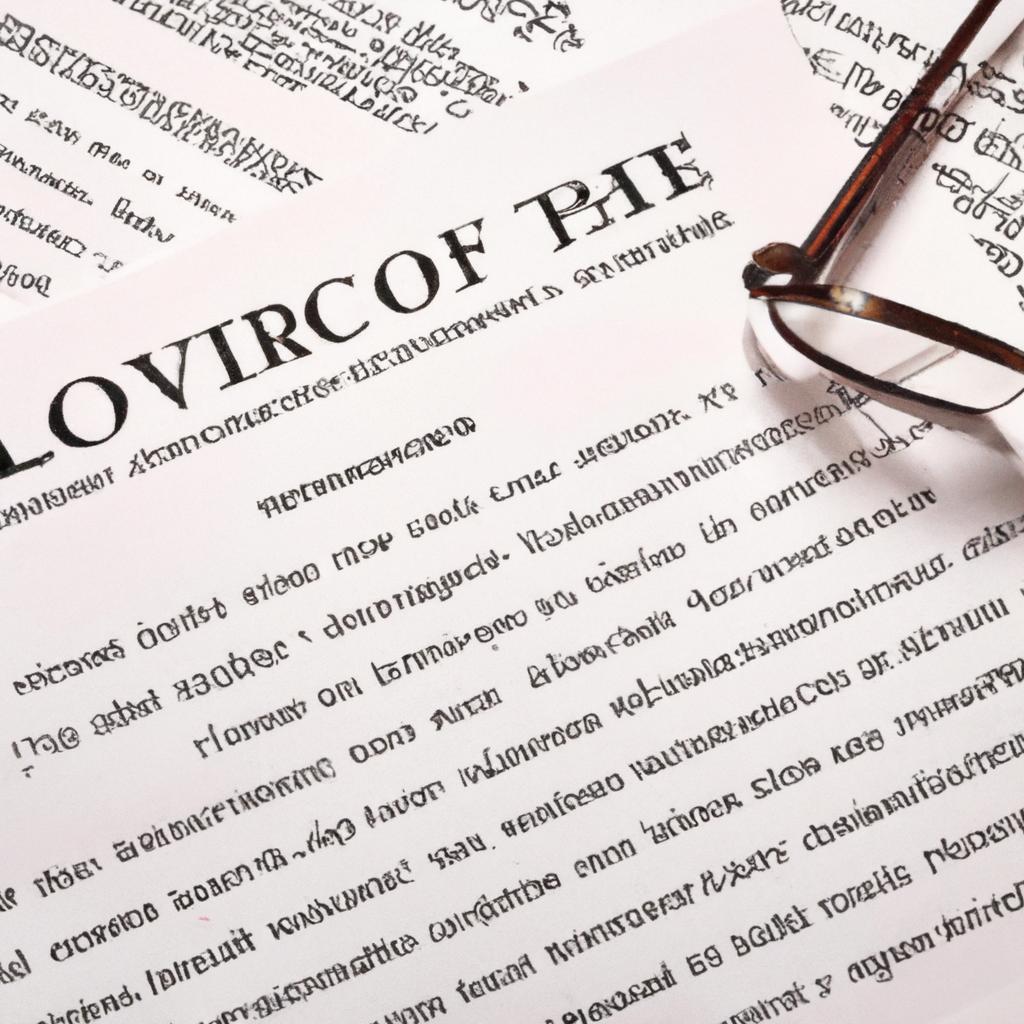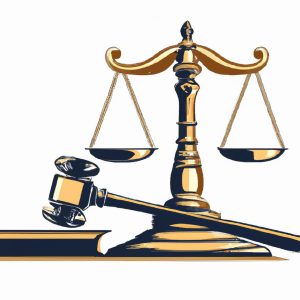In the legal realm of estate planning, the solemn act of probating a will often marks the end of a long and complex process. However, what happens when beneficiaries or disgruntled family members seek to contest a will after probate has been finalized? As seasoned attorneys at Morgan Legal Group in the bustling metropolis of New York City, we have encountered numerous cases where individuals strive to challenge the validity of a will post-probate. Join us as we delve into the intricate world of contesting a will after probate and navigate the nuanced legal procedures that ensue.
Challenging the Validity of a Will Post-Probate
When a loved one passes away, their will goes through the probate process to determine its validity and distribute assets accordingly. However, sometimes beneficiaries or other interested parties may have concerns about the validity of the will even after probate has been completed. can be a complex and challenging process, but it is possible under certain circumstances.
**Reasons to challenge a will after probate:**
-
Undue influence: If it can be proven that the deceased was coerced or manipulated into making changes to their will.
-
Lack of capacity: If the deceased was not of sound mind when creating or amending their will.
-
Fraud: If there is evidence that the will was forged or manipulated in some way.
-
Improper execution: If the will was not signed or witnessed properly according to state law.

Understanding the Legal Grounds for Contesting a Will After Probate
When it comes to contesting a will after probate, it’s crucial to understand the legal grounds that may allow you to challenge the validity of the document. While probate is the process of proving and executing a will, there are certain circumstances in which individuals may have the right to contest it. These grounds typically revolve around suspicions of undue influence, lack of capacity, fraud, or improper execution.
**Here are some common legal grounds for contesting a will after probate:**
-
Lack of testamentary capacity
-
Undue influence
-
Fraud
-
Improper execution
**Table of Legal Grounds for Contesting a Will After Probate:**
Ground Description Lack of testamentary capacity The testator did not have the mental capacity to understand the consequences of their actions when creating the will. Undue influence Someone exerted pressure on the testator to create or change the will in their favor. Fraud The will was procured through deception or misrepresentation. Improper execution The will does not meet the legal requirements for validity, such as witnesses or signatures. As experienced estate planning and probate lawyers at Morgan Legal Group in New York City, we can help you navigate the complexities of contesting a will after probate. If you believe you have valid reasons to challenge a will, contact us for a consultation to discuss your options and legal rights.

Expert Strategies for Successfully Contesting a Will in Court
When it comes to contesting a will after probate, it is crucial to have a clear understanding of the legal process and the strategies that can be employed to increase the chances of a successful outcome. One expert strategy is to thoroughly review the will for any inconsistencies, discrepancies, or signs of undue influence. This can help uncover potential grounds for contesting the validity of the will in court.
Another effective strategy is to gather all relevant evidence and documentation to support your case. This may include witness statements, medical records, financial documents, and any other relevant information that can help bolster your claim. Presenting a strong and compelling case in court is essential when contesting a will, and having a solid foundation of evidence can significantly strengthen your position. By employing these expert strategies and seeking the guidance of experienced legal professionals like the Morgan Legal Group, you can navigate the complexities of contesting a will after probate with confidence and maximize your chances of a favorable outcome.
Expert Strategy Explanation Thoroughly Review the Will Look for inconsistencies, discrepancies, and signs of undue influence. Gather Relevant Evidence Collect witness statements, medical records, and other supporting documentation. 
Navigating the Complexities of Contesting a Will After Probate with Legal Counsel
Contesting a will after probate can be a complex and challenging process, but with the right legal counsel, it is possible to navigate through the intricacies and achieve a favorable outcome. When contesting a will after probate, it is crucial to have a knowledgeable and experienced lawyer on your side who can guide you through the legal system and advocate for your rights.
At Morgan Legal Group, our team of skilled attorneys specializes in estate planning, probate, elder law, wills, and trusts. We have extensive experience in contesting wills after probate and have helped numerous clients successfully challenge wills and achieve their desired results. With our expertise and dedication to client satisfaction, we will work tirelessly to help you navigate the complexities of contesting a will after probate and ensure that your interests are protected.
Q&A
Q: Can a will be contested after probate?
A: Yes, a will can still be contested after probate, although the process can be more complicated.Q: What is probate?
A: Probate is the legal process of proving a will is valid and executing its instructions.Q: What are some reasons a will may be contested after probate?
A: Reasons for contesting a will after probate include fraud, undue influence, lack of capacity, and improper execution.Q: Who can contest a will after probate?
A: Potential challengers to a will after probate include beneficiaries, heirs, and creditors.Q: What is the timeframe for contesting a will after probate?
A: The timeframe for contesting a will after probate varies by jurisdiction, but generally ranges from a few months to a few years.Q: What are the steps involved in contesting a will after probate?
A: Steps in contesting a will after probate may include gathering evidence, filing a formal challenge, and attending a court hearing.Q: What are the potential outcomes of contesting a will after probate?
A: Possible outcomes of contesting a will after probate include invalidating the will, modifying its terms, or upholding its validity.Q: How can someone prepare for contesting a will after probate?
A: To prepare for contesting a will after probate, individuals should consult with an experienced estate attorney and gather supporting documentation.The Conclusion
In conclusion, contesting a will after probate is a complex and challenging process that requires careful consideration and strategic planning. While it may be difficult to navigate the legal proceedings, it is important to remember that seeking justice and protecting your loved ones’ rightful interests are crucial priorities. If you find yourself in a situation where you believe that a will is unjust or invalid, do not hesitate to seek legal advice and explore your options. Remember, the pursuit of truth and fairness is a noble endeavor that deserves your dedication and perseverance. Good luck on your journey to uphold justice and honor the wishes of your loved ones.
 Inheritance is meant to be a smooth and respectful process, where assets are distributed among family members according to the wishes of the deceased. However, this is not always the case. In some instances, family members or other parties may feel dissatisfied with the way a will has been executed, and may want to contest it. While it is possible to contest a will after probate, it is a complex and often emotionally charged process. In this article, we will explore what it means to contest a will after probate, when it is possible to do so, and the steps involved in this legal process.
Inheritance is meant to be a smooth and respectful process, where assets are distributed among family members according to the wishes of the deceased. However, this is not always the case. In some instances, family members or other parties may feel dissatisfied with the way a will has been executed, and may want to contest it. While it is possible to contest a will after probate, it is a complex and often emotionally charged process. In this article, we will explore what it means to contest a will after probate, when it is possible to do so, and the steps involved in this legal process. What is Probate?
Before delving into the details of contesting a will after probate, it is important to understand what probate actually means. When a person dies, their assets, including property and finances, are usually distributed among their chosen beneficiaries according to their will. In order for this process to take place, the will must go through a court-supervised process called probate. Probate is used to make sure that the will is authentic and valid, and to ensure that the deceased person’s final wishes are carried out as outlined in their will.
When Can a Will be Contested?
After a will has gone through the probate process and has been validated by the court, it is considered legally binding. This means that the wishes of the deceased must be carried out as outlined in the will. However, in certain circumstances, it is possible to contest a will even after probate has been completed. These include:
- Fraud or Undue Influence: If it can be proven that the deceased was mislead or coerced into signing the will, or if the will was forged, it can be contested.
- Testamentary Capacity: In order for a will to be considered valid, the person creating the will (testator) must have the mental capacity to understand the document and make informed decisions about their assets. If there are concerns about the testator’s mental capacity at the time the will was created, it can be contested.
- Disputes Over Assets: If there are disputes among family members or other beneficiaries about which assets should go to whom, it is possible to contest the will to seek a fairer distribution of assets.
The Burden of Proof
In order to successfully contest a will after probate, the burden of proof falls on the person challenging the will. This means they must provide evidence to support their claims and convince the court that the will is indeed invalid. The burden of proof is usually higher than in other legal cases, as the will was already considered valid during probate. This is why it is important to have a strong case and seek the help of legal professionals who have experience in will disputes.
Steps to Contesting a Will After Probate
- Consult with a Lawyer: The first step in contesting a will after probate is to seek the advice of a lawyer who specializes in will disputes. They will be able to review the circumstances surrounding the will and advise on the best course of action.
- File a Claim: The next step is to file a claim with the court, stating your reasons for contesting the will. This must be done within a certain timeframe, which varies depending on the jurisdiction.
- Collect Evidence: As mentioned earlier, the burden of proof falls on the person contesting the will. This means gathering evidence to support your claims, which can include medical records, testimony from witnesses, and any other relevant documents.
- Attend Court Hearings: Once the claim has been filed, the court will schedule a hearing to review the case and determine its validity. It is important to attend these hearings and have legal representation present.
- Mediation: In some cases, the court may suggest mediation as a way to resolve the dispute without going to trial. This involves a neutral third party helping both parties come to a mutually agreeable solution.
- Court Decision: If mediation is unsuccessful, the case will proceed to trial. The court will consider all evidence provided and make a final decision as to the validity of the will.
Possible Outcomes
If the court finds that the will is indeed invalid, it may be entirely thrown out or certain parts of it may be deemed invalid. In this case, the distribution of assets will be reassessed according to the laws of the state or province. If the court upholds the validity of the will, then it will be carried out as originally intended.
Benefits and Practical Tips
Contesting a will after probate can be a lengthy and emotional process, but it is important to remember that it is an option for those who feel that the deceased’s final wishes were not accurately reflected in their will. Here are a few practical tips if you are considering contesting a will:
- Seek Legal Advice: As mentioned earlier, it is crucial to have legal representation when contesting a will. A lawyer who specializes in will disputes will be able to offer expert guidance and support throughout the process.
- Gather Evidence: This cannot be stressed enough. Having strong evidence to support your claims is crucial in ensuring a successful outcome when challenging a will.
- Be Prepared for a Lengthy Process: Depending on the complexity of the case and the jurisdiction, contesting a will can take anywhere from a few months to a few years. Be prepared for a potentially lengthy legal process and try to remain patient and focused.
In Conclusion
While the probate process is meant to be a final and fair distribution of the deceased’s assets, circumstances may arise that warrant the contesting of a will after probate has already been completed. It is important to seek expert legal advice, gather sufficient evidence and be prepared for a lengthy process if you choose to challenge a will. Ultimately, the goal is to ensure that the deceased’s final wishes are carried out in a way that is just and fair for all parties involved.






